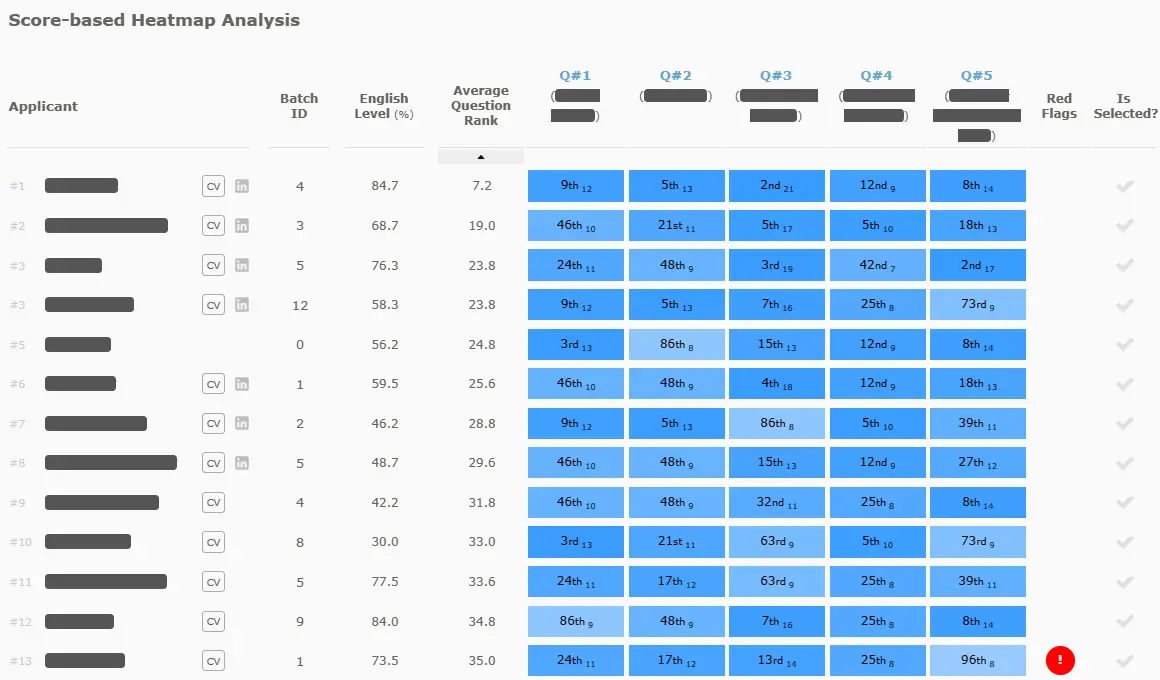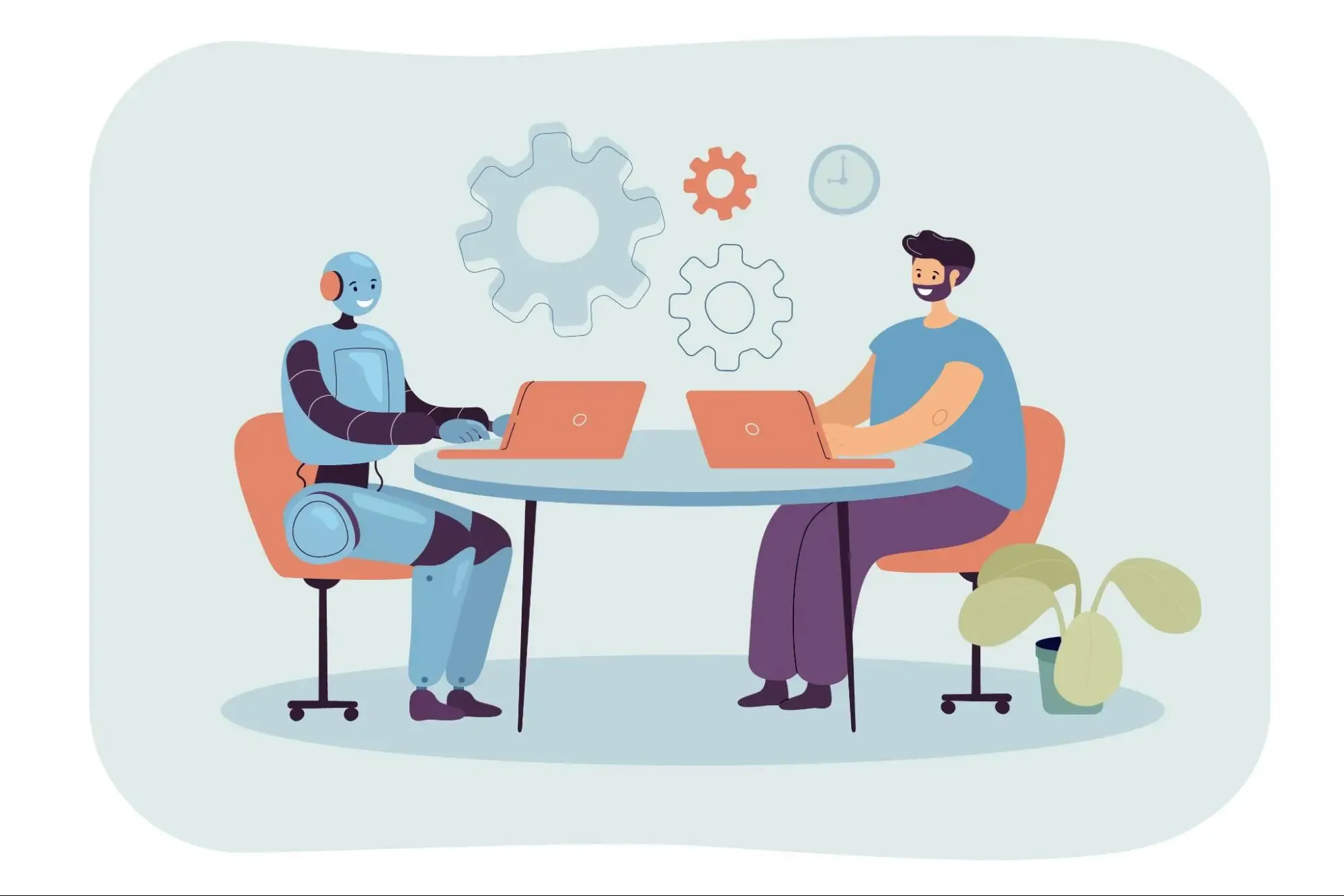If you want to hire a brain surgeon and only five people on the US East Coast can do it, this article is not for you. But if you are an overwhelmed recruiter who has to deal with hundreds or thousands of candidates, we have the solution.
In comes AI recruiting. Let's explore the key ways it can help you hire the best candidates most efficiently, along with common objections and solutions for them.
What is AI recruiting?
AI recruiting involves the strategic incorporation of advanced algorithms and machine learning into the hiring process to deliver better results more efficiently. AI uses computer algorithms to analyze resumes or job interviews quickly in a similar way as an essay grader , interact with candidates and predict who might be the best fit for a job. By automating mundane and administrative tasks, artificial intelligence helps companies to find the right people faster and with less bias.
It's like having an intelligent assistant who augments the talent acquisition team's capabilities by helping to do more work with the same amount or fewer resources.
AI recruiting: Use cases in the recruitment process
AI in recruiting has many use cases that enhance efficiency, objectivity and overall effectiveness while hiring:
Sourcing job seekers
To find the best fit, you may need to search for and attract candidates and expand your talent pool. AI-powered tools offer a range of features to streamline this process. You can use filters to narrow down candidates based on various criteria, such as industry, skills and experience.
Additionally, you can use a Boolean search, which allows you to combine words and phrases using the words AND, OR and NOT to refine your search further. Another valuable feature is the ability to receive suggestions for similar profiles based on your searches, which lets you uncover potential candidates who may not have appeared in your initial search but share relevant characteristics.
Screening resumes in a flash
AI recruiting software quickly reads and understands resumes using natural language processing (NLP) technology. They pick out important details like skills, qualifications and work experiences from resumes, helping recruiters get a fast and clear overview of a candidate's background.
To speed up the hiring process, AI compares candidate applications with predefined criteria, like job requirements and qualifications.

AI reviews past performance and skills to predict candidate fit and highlight likely successful hires.
Also, AI algorithms analyze historical data to predict a candidate's potential fit for a specific role based on their skills, experiences and past performance. This helps recruiters identify candidates who are likely to succeed in the position.
One-way video interviewing
If you're conducting regular interviews, you're probably accustomed to sitting in a room for hours, watching potential candidates answer your predetermined questions and filling out many interview evaluation forms.
By leveraging AI, you can forget about screen fatigue and missing important details because you lose concentration – AI platforms don’t get tired, and they can rate every candidate based on the same criteria. You’ll save hundreds of hours to focus on things that matter most, like strategic tasks and employee relationships.
One of the best comprehensive solutions for one-way video assessment is VireUp's video interviewing software. This is why:
-
Competency-based questions: VireUp assists recruiters in creating competency-based interview questions tailored to different positions. That way, you'll always have a standardized evaluation process.
-
Effortless screening: This skill assessment software uses AI to analyze the entire interview, sentence by sentence. Recruiters benefit from an explainable AI that shows evidence of its conclusions, so you don't have to watch each interview.
-
Language assessment: VireUp automatically assesses spoken English proficiency as applicants respond to interview questions.
-
Coaching-level feedback: Most applicants (94%) want to receive interview feedback, but only 41% do, according to LinkedIn research. This is your chance to stand out and position yourself as an employer of choice with VireUp's coaching-level feedback, which offers valuable insights into candidates’ performance.

AI recruiting video interview platform: VireUp
Interacting with candidates
Here is how you can use AI recruiting tools to interact with potential candidates:
-
Chatbots for interaction: AI-driven chatbots engage with candidates on company websites or application portals, answering common candidate questions and providing information about the hiring process.
-
Status updates: AI can offer status updates on candidates' applications, keeping them informed about the progress of their recruitment process. This helps to maintain transparency and manage candidate expectations.
-
Feedback collection: AI tools can collect feedback from candidates about their hiring experience. This feedback helps recruiters improve their processes and provides insights into the candidate's perspective.
-
Personalized communication: AI can analyze candidate data to personalize communication, tailoring messages based on the candidate's preferences, experiences and interactions with the company. This creates a more individualized and positive experience.
-
Company feedback: AI recruiting software can send personalized feedback automatically once the recruitment process is done. That way, even rejected candidates feel heard and appreciated by the company. They are more likely to apply for a job again when they improve their skills or even be a customer of the company at some point.

AI handles candidate engagement: chatbots for questions, status updates, feedback collection, and personalized communication for a more positive hiring experience.
Creating and posting job ads
Here’s how AI can help you with job ads:
-
Job ad content optimization: AI-powered recruiting software can analyze successful job postings and suggest relevant keywords, formatting and unbiased language to ensure that the content appeals to a diverse range of qualified candidates.
-
Automated job posting: AI enables the automated posting of job ads across multiple platforms, including job boards, social media and company websites.
-
Performance analytics: AI recruiting software provides analytics on the performance of job ads, tracking metrics such as views, clicks and applicant conversions.
-
Real-time market insights: AI and machine learning tools provide data-driven insights into current market trends, competitor job postings and salary benchmarks.
-
A/B Testing: AI can perform A/B testing of different job ad variations to identify which elements, such as headlines or descriptions, have the most effect on job seekers.
Scheduling
When trying to hire a lot of people at the same time, you can get into a complete mess trying to coordinate scheduling interviews, let alone conducting them. AI tools automate the scheduling of interviews by analyzing the availability of both candidates and interviewers, considering time zones and preferences to find suitable time slots and minimizing back-and-forth communication.
Integration with calendars ensures efficiency, and some tools enable candidate self-scheduling for added flexibility. AI also facilitates panel interview coordination and integrates with Applicant Tracking Systems (ATS) for a comprehensive recruitment workflow.
However, thanks to automated and self-service job interviews provided by platforms like VireUp, you don't need to worry about scheduling anymore because it may not even be relevant for many roles.
Why invest in AI recruiting?
Investing in AI recruiting tools offers several benefits for organizations looking to optimize their hiring process:
Saving time and money
-
Time savings: AI streamlines time-consuming tasks like resume screening, interview scheduling, interview content analysis and candidate communication, allowing recruiters to focus on strategic and high-value activities. With VireUp, you can expect a 40% faster recruitment cycle time.

VireUp cuts recruitment time by 40%
-
Cost savings: The efficiency affects cost reduction, of course. By automating repetitive tasks, AI reduces the need for extensive manual labor and minimizes the risk of human errors, leading to cost savings in terms of resources and potential recruitment expenses. With VireUp, you can save up to 45% on recruitment costs.
Hiring more qualified candidates
AI helps recruiting teams to find the most promising candidate, which is very hard, especially if you're recruiting among hundreds of people.
AI generates valuable insights about job applicants through data analytics, helping recruiters make informed decisions. Predictive analytics can identify the most promising candidates, improving the chances of successful hires and reducing turnover.
According to the Society for Human Resource Management's (SHRM) research, nearly 3 in 5 HR professionals say the quality of their organization’s hires is somewhat (50%) or much (9%) better due to their use of recruitment automation or AI.
Improving the candidate's experience in the hiring process
AI recruitment tools make the candidate experience better by:
-
Personalizing interactions
-
Ensuring fast communication
-
Facilitating application submissions
-
Collecting and providing feedback
-
Reducing bias
AI can help you achieve an 80% reduction in candidate dissatisfaction. Overall, the result is a more engaging, transparent and positive candidate journey that is essential for employer branding.
Streamlining operations for scalable growth

AI recruiting tools adapt to seasonal demand and support scalable growth.
During specific times of the year, such as the launch of talent programs around the graduation period of universities or the introduction of a new product, recruitment teams often experience demand surges.
AI recruiting tools efficiently handle increased workloads and adapt to these seasonal fluctuations. You can use AI systems according to your organization's changing recruitment needs. This adaptability is crucial for scalable growth.
AI recruiting: Common objections and solutions
Even though there are tons of benefits for hiring managers using AI in the recruiting process, there are also some concerns about AI software solutions:
Bias
Objection: Some people worry that AI may introduce unconscious bias or carry on biases in the hiring process. It is clear why these concerns exist – if historical data used to train AI models already have biases in the selection process, the AI system might carry on those biases, potentially leading to discriminatory outcomes.
Solution: You should implement AI algorithms that are designed to be unbiased, auditable and explainable, so you know why the system made the conclusion it did. The technology should evaluate candidates based on skills and credentials instead of demographic factors. Regularly audit and update algorithms to minimize bias.
Privacy concerns
Objection: Candidates may be concerned about the privacy of their personal data when interacting with AI systems. As AI systems analyze large amounts of candidate information, questions arise about how data is stored, who has access and how it's used. Candidates fear potential misuse or unauthorized access to sensitive information.
Solution: You should clearly communicate and execute data protection measures and ensure compliance with privacy regulations. Implementing secure data storage practices, anonymizing personal information and obtaining explicit consent from candidates regarding data usage are some of the fundamental measures.
To learn more about the ethical considerations and regulations around AI, listen to the webinar I did with the leading experts in the field, the Assistant Director at the Institute for Ethical AI Esra Karahasanoglu and a cross-cultural AI ethics advisor Ayca Ariyoruk:
Cost and implementation

By choosing AI tools that fit your budget you minimize setup hassles.
Objection: Companies might be hesitant to implement AI in the recruiting process because of the perceived high costs and challenges in implementing AI recruiting solutions. In fact, of those who don’t use automation or AI to support HR-related activities, 44% said that they lack resources (time, money, labor) to properly audit or correct AI algorithms, and 34% said that they can’t afford to implement automation or AI, according to an SHRM study.
Solution: Reducing the costs is actually the main value of automation. Choosing cost-effective AI solutions that align with your organization's budget and needs will be immensely critical. Many AI tools offer flexible pricing models and can be integrated with existing systems, minimizing implementation challenges. Bear in mind that the long-term cost savings often outweigh the initial investment.
No personalization
Objection: Some fear AI may lead to a lack of personalized interactions or human touch, affecting the overall candidate experience.
Solution: You can select AI tools with personalization features. AI can be programmed to tailor communications, answer candidate questions, provide feedback and recommend roles based on individual candidate profiles.
Conclusion
If your company is rapidly growing, artificial intelligence-powered tools can help solve many of your problems. By automating different recruitment processes, from sourcing and screening candidates to personalized interactions and interviewing, AI helps to identify the best candidates while saving time, reducing costs and enhancing the overall candidate experience.
Still, there are concerns surrounding bias, privacy, expenses and customization when using AI in recruitment. The solutions are out there, but you need to find the tools that incorporate all of them and suit your needs.
If you want to interview thousands of people while reducing costs and time, VireUp might be the answer. Book a free demo to learn how we can help you make the most of AI.
FAQs
How are companies using AI for recruitment?
A big retail company, Metro, used AI for one-way video interviews – while conducting more than 500 interviews using VireUp AI, the company cut their recruitment time by half and increased their candidate throughput six times.
Apart from video interviewing, companies are using AI for:
-
Sourcing
-
Screening resumes
-
Interacting with candidates
-
Creating and posting job ads
-
Interview scheduling
-
Creating pre-employment tests
What is the danger of AI in recruitment?
The danger of AI in recruitment lies in the potential reinforcement of biases. If historical data used to train AI models reflect biases in hiring decisions, the AI system may continue to use these biases, leading to discriminatory outcomes in hiring. Additionally, there can occur problems with privacy and lack of personalization.
As we mentioned, there are solutions to all these – it’s a matter of finding a software solution that supports ethical and unbiased decision-making.
Does Google use AI in recruitment?
Google has been reported to use AI and machine learning in various aspects of its recruitment process. It is known for employing advanced technologies to streamline its hiring procedures, from screening resumes to assessing candidates' skills and potential cultural fit.
How big is the AI recruiting market?
The global AI recruitment market is anticipated to grow steadily according to business valuation firms, from its 2022 valuation of $630 million to over $830 million by 2028. AI continues to reshape recruitment strategies, with 79% of recruiters predicting that AI will soon play a pivotal role in hiring and firing decisions, while other trends such as the rise of mobile recruiting and social media are transforming how companies attract top talent.
Why is AI recruitment important?
AI recruitment is crucial for the hiring industry because it:
-
Automates tasks like resume screening, candidate sourcing and interview scheduling
-
Significantly accelerates the recruiting process
-
Enhances decision-making with its predictive analytics
-
Identifies top candidates efficiently
-
Minimizes biases in candidate evaluation, promoting fairness and diversity
-
Improves the candidate experience by providing regular updates and feedback
Image sources: Freepik, Unsplash, Pexels

